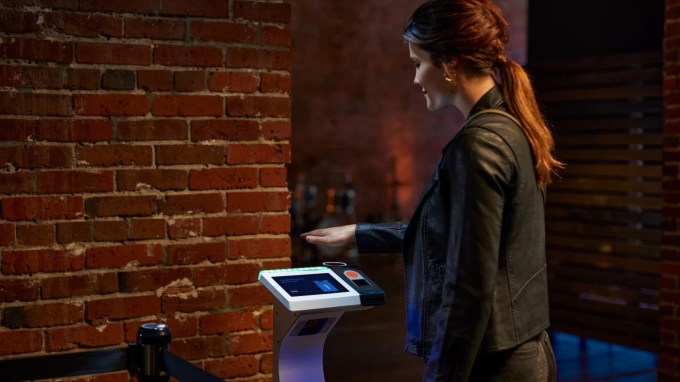
[ad_1]
Amazon’s biometric scanner for retail, the Amazon One palm reader, is expanding beyond the e-commerce giant’s own stores. The company announced today it has acquired its initial third-party customer with ticketing company AXS, which will implement the Amazon One system at Denver, Colorado’s Red Rocks Amphitheatre as an option for contactless entry for event-goers.
This is the first time the Amazon One system will be used outside an Amazon-owned retail store, and the first time it’s used for entry into an entertainment venue. Amazon says it expects AXS to roll out the system to more venues in the future, but didn’t offer any specifics as to which ones or when.
At Red Rocks, guests will be able to associate their AXS Mobile ID with Amazon One at dedicated stations before they enter the amphitheatre, or they can enroll at a second station once inside in order to use the reader at future AXS events. The enrollment process takes about a minute and customers can choose to enroll either one or both palms. Once set up, ticketholders can use a dedicated entry line for Amazon One users.
“We are proud to work with Amazon to continue shaping the future of ticketing through cutting-edge innovation,” said Bryan Perez, CEO of AXS, in a statement. “We are also excited to bring Amazon One to our clients and the industry at a time when there is a need for fast, convenient, and contactless ticketing solutions. At AXS, we are continually deploying new technologies to develop secure and smarter ticketing offerings that improve the fan experience before, during, and after events,” he added.

Image Credits: Amazon
Amazon’s palm reader was first introduced amid the pandemic in September 2020, as a way for shoppers to pay at Amazon Go convenience stores using their palm. To use the system, customers would first insert their credit card then hover their palm over the device to associate their unique palm print with their payment mechanism. After setup, customers could enter the store just by holding their palm above the biometric scanner for a second or so. Amazon touted the system as a safer, “contactless” means of payment, as customers aren’t supposed to actually touch the reader. (Hopefully, that’s the case, considering the pandemic rages on.)
On the tech side, Amazon One uses computer vision technology to create the palm signatures, it said.
In the months that followed, Amazon expanded the biometric system to several more stores, including other Amazon Go convenience stores, Amazon Go Grocery stores and its Amazon Books and Amazon 4-star stores. This April, it brought the system to select Whole Foods locations. To encourage more sign-ups, Amazon even introduced a $10 promotional credit to enroll your palm prints at its supported stores.
Customers can decide if they want to link their Amazon One ID with their Amazon account. And the data remains with Amazon until a customer explicitly deletes it, or if the customer doesn’t use the feature for at least two years.
In terms of the new agreement with AXS, customers who enroll with AXS are giving consent to AXS to share their email address with Amazon for the purpose of creating an Amazon One ID. But Amazon says it doesn’t receive any information from AXS regarding tickets or purchases with an Amazon One user attends an AXS event.
While the system offers an interesting take on contactless payments, Amazon’s track record in this area has raised privacy concerns. The company had in the past sold biometric facial recognition services to law enforcement in the U.S. Its facial recognition technology was the subject of a data privacy lawsuit. And it was found to be still storing Alexa voice data even after users deleted their audio files.
Amazon has responded by noting its palm print images are encrypted and sent to a secure area built for Amazon One in the cloud where Amazon creates the customers’ palm signatures. It also has noted it allows customers to unenroll from either a device or from its website, one.amazon.com once all transactions have been processed.
Updated, 9/15/21 with more information provided by Amazon on data-sharing between AXS and Amazon.
[ad_2]
Source link